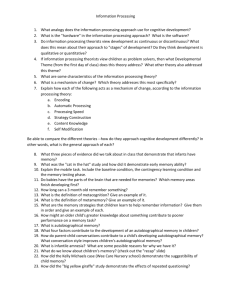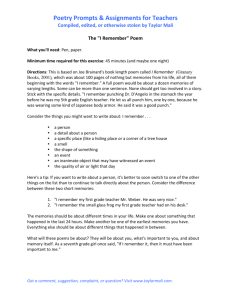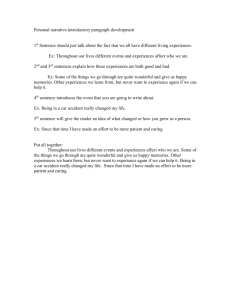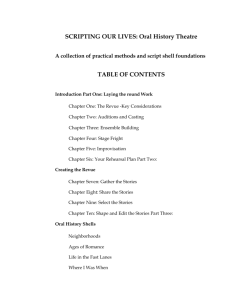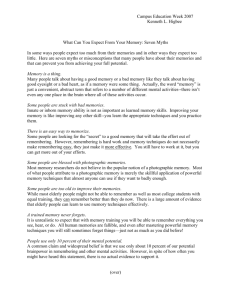The Grand Delusion: Why nothing is as it seems
advertisement
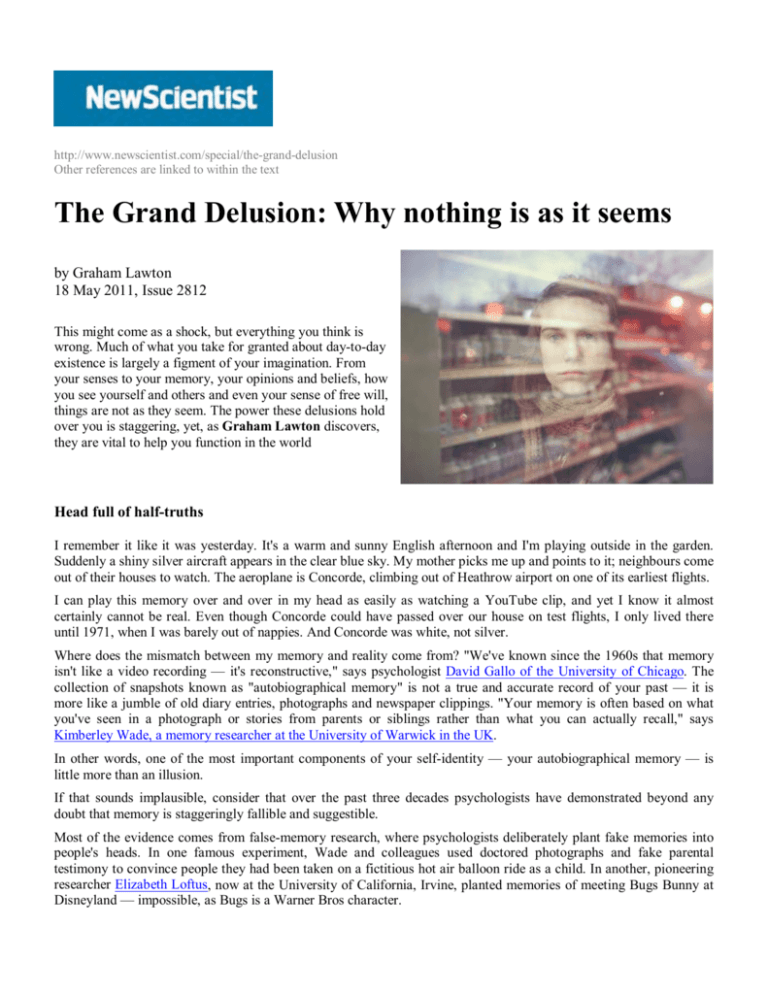
http://www.newscientist.com/special/the-grand-delusion Other references are linked to within the text The Grand Delusion: Why nothing is as it seems by Graham Lawton 18 May 2011, Issue 2812 This might come as a shock, but everything you think is wrong. Much of what you take for granted about day-to-day existence is largely a figment of your imagination. From your senses to your memory, your opinions and beliefs, how you see yourself and others and even your sense of free will, things are not as they seem. The power these delusions hold over you is staggering, yet, as Graham Lawton discovers, they are vital to help you function in the world Head full of half-truths I remember it like it was yesterday. It's a warm and sunny English afternoon and I'm playing outside in the garden. Suddenly a shiny silver aircraft appears in the clear blue sky. My mother picks me up and points to it; neighbours come out of their houses to watch. The aeroplane is Concorde, climbing out of Heathrow airport on one of its earliest flights. I can play this memory over and over in my head as easily as watching a YouTube clip, and yet I know it almost certainly cannot be real. Even though Concorde could have passed over our house on test flights, I only lived there until 1971, when I was barely out of nappies. And Concorde was white, not silver. Where does the mismatch between my memory and reality come from? "We've known since the 1960s that memory isn't like a video recording — it's reconstructive," says psychologist David Gallo of the University of Chicago. The collection of snapshots known as "autobiographical memory" is not a true and accurate record of your past — it is more like a jumble of old diary entries, photographs and newspaper clippings. "Your memory is often based on what you've seen in a photograph or stories from parents or siblings rather than what you can actually recall," says Kimberley Wade, a memory researcher at the University of Warwick in the UK. In other words, one of the most important components of your self-identity — your autobiographical memory — is little more than an illusion. If that sounds implausible, consider that over the past three decades psychologists have demonstrated beyond any doubt that memory is staggeringly fallible and suggestible. Most of the evidence comes from false-memory research, where psychologists deliberately plant fake memories into people's heads. In one famous experiment, Wade and colleagues used doctored photographs and fake parental testimony to convince people they had been taken on a fictitious hot air balloon ride as a child. In another, pioneering researcher Elizabeth Loftus, now at the University of California, Irvine, planted memories of meeting Bugs Bunny at Disneyland — impossible, as Bugs is a Warner Bros character. The success rate of such flagrant manipulation is only about 30 per cent, but Gallo says that everybody's memory is susceptible to some extent. "It's an automatic consequence of how our brains process information," he says. "You cannot remember everything so your mind summarises and remembers the gist of experiences. You form associations and draw inferences. That gives memory great power, but it comes at a cost." It's one thing to implant memories in a controlled lab setting, but how often does it happen in real life? "We don't have a firm grasp on that," says Gallo. "How could you really know, without some measure of what actually happened or some corroborating evidence?" Even so, he says the fact that memory is so easily tricked in the laboratory suggests that it must be in daily life too. There are a number of lines of evidence that this is the case. Some of the best come from studying "flashbulb" memories of momentous events such as the terrorist attacks of 9/11 or the death of Princess Diana. Many people have a vivid recollection of what they were doing when they heard the news of such events, and are very confident that these memories are accurate. But guess what: these memories turn out to be wrong a surprising amount of the time. Within days of 9/11, psychologists at the University of Illinois at Chicago asked nearly 700 people where they were, what they were doing, how they heard the news and who they were with at the time. A year later they asked them again. More than half of the participants had changed their story on at least one count — while still expressing supreme confidence that their memories were accurate. Flashbulb memory is also highly suggestible. In 2002, psychologists from the University of Portsmouth in the UK went to a local shopping centre and asked people about their memories of the death of Diana, including whether they had seen "the footage" of the actual crash. Nearly half said they had, despite the fact that no footage exists. An even higher percentage of people confidently "remembered" seeing non-existent TV footage of a Boeing 747 crashing in Amsterdam, the Netherlands, in 1992. If such vivid and confidently held memories can be so riddled with inaccuracy and open to revision, it is probably true that all autobiographical memories are suspect. "I don't think you can put a figure on it, but I'd be confident that the vast majority are not 100 per cent accurate," says Wade. Again, there is evidence that this is the case. When researchers at the University of Canterbury in New Zealand asked twins about their shared childhood, they discovered that most pairs have at least one disputed memory — an event they are both convinced happened to them and not to their twin. Gallo also suggests that spousal arguments, which often revolve around disputed accounts of the same event, is an area ripe for exploration. It also turns out that my Concorde memory is not that unusual. Last year, Giuliana Mazzoni at the University of Hull in the UK found that 20 per cent of people have autobiographical memories that they do not believe to be true, often because they contradict established fact. Does it matter that our autobiographical memories are flawed? "In some ways it's terrifying to think just how spectacularly wrong they might be," says Wade. "Memories are part of your narrative, part of your self-identity." There are legal ramifications too. If you witnessed a crime and were asked to give testimony about it in court, how confident would you be of giving an accurate report? In many other respects, though, it matters not. My memory of seeing Concorde has no material effect on my life. In fact, according to Wade, the illusory quality of memory is now seen as a strength rather than a weakness. Memory is no longer conceived as being exclusively about the past, but as part of a generalised "mental time travel" module that allows us to construct and test future scenarios based on past experience. If memory were inflexible that would not be possible. It seems having a head full of half-truths is the price we pay for being able to see the future. What you see is not what you get Your senses are your windows on the world, and you probably think they do a fair job at capturing an accurate depiction of reality. Don't kid yourself. Sensory perception — especially vision — is a figment of your imagination. "What you're experiencing is largely the product of what's inside your head," says psychologist Ron Rensink at the University of British Columbia in Vancouver, Canada. "It's informed by what comes in through your eyes, but it's not directly reflecting it." Given the basic features of your visual system, it couldn't be any other way. For example, every 5 seconds or so, you blink. Yet unless you're thinking about it, as you probably are right now, you don't notice the blackouts because your brain edits them out. Blinking is just the tip of the iceberg. Even when your eyes are open they're only taking in a fraction of the visual information that is available. In the centre of your retina is a dense patch of photoreceptor cells about 1 millimetre across. This is the fovea, the visual system's sweet spot where perception of detail and colour is at its best. "When you move away from the fovea, visual acuity falls away really quickly, and colour vision disappears," says Rensink. About 10 degrees to the side of the fovea, visual acuity is only about 20 per cent of the maximum. What that means is you can only capture a tiny percentage of the visual field in full colour and detail at any one time. Hold your hand at arm's length and look at your thumbnail. That is roughly the area covered by the fovea. Most of the rest is captured in fuzzy monochrome. And yet vision doesn't actually feel like this: it feels like a movie. That, in part, is because your eyes are constantly flitting over the visual scene, fixing on one spot for a fraction of a second then moving on. These jerky eye movements are called saccades and they happen about 3 times a second and last up to 200 milliseconds. With each fixation your visual system grabs a bite of high-resolution detail which it somehow weaves together to create an illusion of completeness. That's remarkable given that during saccades themselves, you are effectively blind. Your eyes don't stop transmitting information as they lurch from one fixation to the next, but for about 100 milliseconds your brain is not processing it. Look in the mirror and deliberately flick your eyes from left to right and back again. You won't see your eyes move — not because the movement is too fast (other people's saccades are visible), but because your brain isn't processing the information. Given that you perform approximately 150,000 saccades every day, that means your visual system is "offline" for a total of about 4 hours during each waking day even without blinking (Trends in Cognitive Sciences, vol 12, p 466). Yet you don't notice anything amiss. Exactly how your brain weaves such fragmentary information into the smooth technicolour movie that we experience as reality remains a mystery. One leading idea is that it makes a prediction and then uses the foveal "spotlight" to verify it. "We create something internally and then we check, check, check," says Rensink. "Essentially we experience the brain's best guess about what is happening now." In conjuring up this "now", the visual system has to do something even more remarkable: predict the future. Information striking the fovea cannot be relayed instantaneously to conscious perception: first it has to travel down the optic nerve and be processed by the brain. This takes several hundred milliseconds, by which time the world has moved on. And so the brain makes a prediction about what the world will look like about 200 milliseconds into the future, and that is what you see. Without this future projection you would be unable to catch a ball, dodge moving objects or walk around without crashing into things. There's another huge hole in the visual system that can render you oblivious to things that should be unmissable. The jerky movements that shift your fovea around the visual scene don't happen at random — they are directed by your brain's attentional system. Sometimes you consciously decide what to attend to, such as when you read. At other times your attention is grabbed by a movement in your peripheral vision or an unexpected noise. The problem with attention is that it is a limited resource. For reasons that remain unknown, most people are unable to keep track of more than four or five moving objects at once. That can lead your visual system to be oblivious to things that are staring you in the face. The most famous demonstration of this "inattention blindness" is the invisible gorilla, a video-based experiment created by Daniel Simons and Christopher Chabris at the University of Illinois at UrbanaChampaign. Viewers are asked to pay close attention to a specific aspect of a basketball game, and around half completely fail to see a person in a gorilla suit walk slowly across the screen, beat their chest and walk off again. Blind to bias Whatever your opinion of President Barack Obama, it isn't hard to find someone who disagrees. A recent poll in the US found that Obama is the most divisive president since the 1950s: 81 per cent of fellow Democrats think he's doing a good job but only 13 per cent of opposing Republicans agree. How can so many people make a judgement about the same person and come to such different conclusions? The obvious explanation is that they are biased — by their political affiliations, by the media, by their friends and family and much else. This obvious explanation is correct. But who, precisely, is biased? It depends who you ask. Those who approve of Obama think the conservatives, and their media, are the biased ones. Those who don't, think it's the liberals. In fact, they are both right. As any psychologist will tell you, pretty much everything you think and do is coloured by biases that you are typically totally unaware of. Rather than seeing the world as it is, you see it through a veil of prejudice and self-serving hypocrisies. To get a handle on this, think about your own opinion of Obama. You probably believe your view to be an honest and objective assessment based on a range of evidence from both sides. Perhaps you'll grudgingly acknowledge that you feel the way you do because you are liberal/conservative, but then reassure yourself that being liberal/conservative is the only rational choice, so that's OK. You have just experienced the illusion of naive realism — the conviction that you, and perhaps you alone, perceive the world as it really is, and that anybody who sees it differently is biased. According to Emily Pronin, a psychologist at Princeton University, this conviction is "inescapable and deep". If, at this point, you are thinking: "Yeah, right, that might be true of other people, but not me," then you have fallen foul of yet another aspect of the illusion: the bias blind spot. Most people will happily acknowledge that such biases exist, but only in other people. "It's not that we're blind to the concept of bias, or to the fact that it exists," says Pronin. "We're just blind to it in our own case." Why are we so blinkered? The problem is that our biases — which form and solidify in childhood and early adulthood — operate below the radar, in our subconscious. It is not that people do not look inwards to question their own judgements and beliefs. Many do. But their biases are not consciously available for inspection, so they leap to the conclusion that their beliefs are correct and based on rational reasoning. Many of the biases are a harmless variant of the positive illusions we routinely entertain in order to shelter our fragile egos from reality, such as a tendency to take credit for success but deny responsibility for failure. Others are more serious. Few people believe that they are racist or sexist, and their beliefs are honestly held, and yet time and again they are betrayed by their actions. In one experiment, people were shown a picture of a man and a woman and asked to say which they would prefer as police chief. They were also told that the male candidate was "streetwise" and the female candidate "formally educated", or vice versa. Most people chose the male candidate and then, when asked why, justified their decision by saying that whichever quality had been attributed to him was more important for the job. While opinions are obviously ripe for bias, facts are also at its mercy, with people adept at interpreting the world to fit with their existing beliefs. For example, environmentalists interpret the fact that most scientists and governments are convinced that humans are changing the climate as open-and-shut evidence that we are. But sceptics just see a conspiracy. No amount of new information will change their minds, and yet on the whole, both camps sincerely believe their views are unbiased and rational. Similarly, we seek out information that fits with our beliefs and ignore or dismiss information that doesn't. This "confirmation bias" has been shown time and again, for example in experiments in which people are asked to read a range of evidence about a contentious topic such as capital punishment. Even when exposed to arguments on both sides, most people interpret the evidence in a self-serving way, accepting the data that supports their views and dismissing or ignoring the rest. The scary thing is that they have no awareness of doing it. Similarly, confronting people with new information that contradicts their beliefs more often than not ends up hardening their position. Sadly, even knowing that you are biased doesn't necessarily help. "I know that I am susceptible to all sorts of biases because I'm a human being," says Pronin. "But in a given instance, I'm still not likely to be aware of it." Egotist, moi? How's your driving? If you are anything like the average person, you probably think it is pretty good. One study found that 74 per cent of drivers believed themselves to be better than average behind the wheel. And, perversely, those who had been in a crash were slightly more confident about their abilities than drivers who had not been. This, of course, does not reflect reality. Unless there are a handful of truly dreadful drivers, not everybody can be better than average. And yet if you ask people to rate themselves on almost any positive trait — competence, intelligence, honesty, originality, friendliness, reliability and many others — most put themselves in the better-than-average category. Ask them similar questions about negative traits and they will rate themselves as less likely than average to possess them. This egotistic illusion has been imaginatively dubbed the "better-than-average effect". It is incredibly pervasive, yet goes largely unnoticed. In an ironic twist, most people believe themselves to be more resistant than average to having an inflated opinion of themselves. We also inflate our opinions of loved ones. Around 95 per cent of people rate their partner as smarter, more attractive, warmer and funnier than average. And as anyone who has endured a 30-something dinner party will testify, parents almost universally rate their children as cleverer, cuter and more developmentally advanced than their peers. The better-than-average effect is just one of a number of positive illusions — ways we kid ourselves that we are special. Another is optimism bias, a well-established effect characterised by unrealistic expectations about the future. Most people expect to live longer, healthier and more successful lives than average while underestimating their chances of getting divorced, falling ill or having an accident. And the more (or less) desirable the outcome, the stronger people believe it will (or won't) happen to them. Where do such illusions come from? According to Jonathon Brown at the University of Washington in Seattle, one of the originators of the theory of positive illusions, it all starts in childhood. "Parents create them by fawning over their children," he says. The fawning doesn't stop there. Throughout life, we have an innate tendency to divide the world into "us" and "them". As soon as you forge a connection with someone, you become part of their in-group — and humans are hard-wired to see members of their ingroup more positively than they see others. In this way we all sign up to various mutual appreciation societies that exaggerate our virtues, ignore our faults and look down on outsiders. No wonder most of us feel excessively positive about ourselves. Far from being pathological, though, positive illusions are now viewed as being a marker of a healthy mind. People who don't harbour them are more likely to be clinically depressed — a state called depressive realism. But however deluded you are about yourself, chances are you are even more so about how you think others perceive you. Everybody wonders and worries about how they come across to others, and most of us think we have a pretty good handle on it. But we don't. "People are nowhere near as good at it as they think," says Nicholas Epley, a behavioural scientist at the University of Chicago. That is not to say we are completely useless. If you think of yourself as generous, for example, other people probably do too. Just not quite to the extent you might like. From moment to moment, however, we are surprisingly poor at intuiting how we are coming across. This is largely down to something called the "spotlight effect" — the deluded belief that everything you do and say is being closely observed and scrutinised. "Because we're so aware of ourselves it can be easy to think that others are noticing us when they're not," says Epley. As a result, we blow everything out of proportion. "Say you spill water on yourself so it looks like you peed your pants," says Epley. "You assume everyone is going to notice. But they don't, because the world doesn't really revolve around you." People also assume that their emotional states are broadcast to all and sundry when in fact they are largely invisible. It also works the other way. If you do or say something you think is especially clever or admirable, you're likely to overestimate the extent to which other people will notice. Most of the time they won't even register because they are too busy tending to their own ego. The central problem is that you know yourself too well. "You're an expert on yourself," says Epley. "That means you notice all kinds of subtle things about yourself that others simply don't. They see general characteristics." This is compounded by the fact that we have difficulty guessing what other people are thinking. "We have imperfect tools for getting into their minds," says Epley. "We watch their faces and behaviour and try to get some sense of what they're thinking, but behaviour doesn't always reflect attitudes very well." Surprisingly, our lack of insight doesn't disappear when we're around people we know well: accuracy does go up, but only slightly. There is even evidence that your ability to read the mind of your spouse actually drops after the first year of marriage. "People are actually better at knowing how well they're communicating with a stranger. You believe you know your partner very well as you spend more time together, but this can actually create more of an illusion of insight than actual insight," says Epley. Perhaps the area where we have the least insight is physical appearance. Everybody knows what they look like, but when it comes to judging how we look, we're absolutely hopeless. For example, if you ask people to locate a photograph of themselves in a sea of faces they find it faster if it has been morphed to look more attractive, suggesting we all think we're better looking than we actually are. "When we ask people to rate how attractively they will be rated by somebody else and correlate it with actual ratings of attractiveness, we find no correlation," says Epley. "Zero! This still shocks me. For crying out loud, you ought to get some sense of whether you're hot or not. But it seems not." Who’s in Control? This is the big one. The notion that we have free will — the ability to exercise conscious control over our actions and decisions — is deeply embedded in human experience. But the more we learn about the physical universe and the human brain, the less plausible it becomes (New Scientist, 16 April, p 32). One argument goes as follows: the universe, including the bits of it that make up your brain, is entirely deterministic. The state it is in right now determines the state it will be a millisecond, a month or a million years from now. Therefore free will cannot exist. Neuroscience has also chipped in. Around 30 years ago psychologist Benjamin Libet discovered that if you ask people to make voluntary movements, their brains initiate the movement before they become consciously aware of any intention to move. Other experiments have since been performed along similar lines, leading many neuroscientists to conclude that free will is an illusion. But it feels so real. We all have a sense of agency — the conviction that even though we did one thing, we could have done another, and that at any given moment we have free choice of any number of actions. Yet it seems that this is an elaborate illusion created by your brain. The conclusion is inescapable. We really are deluded.
